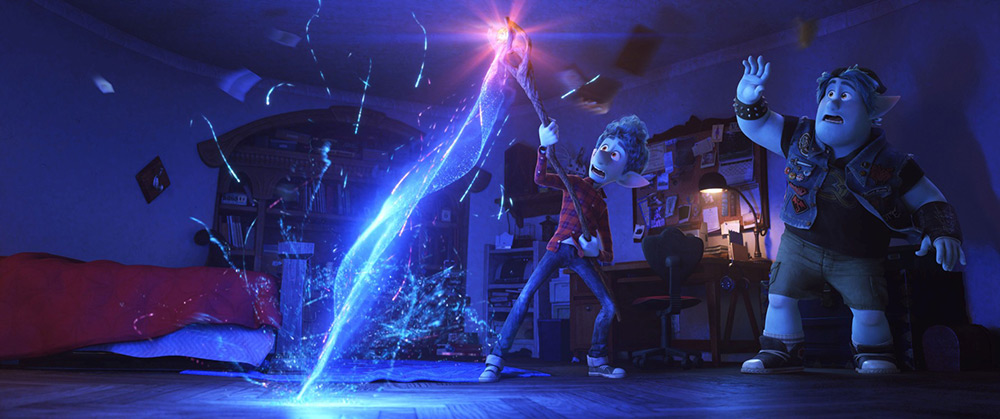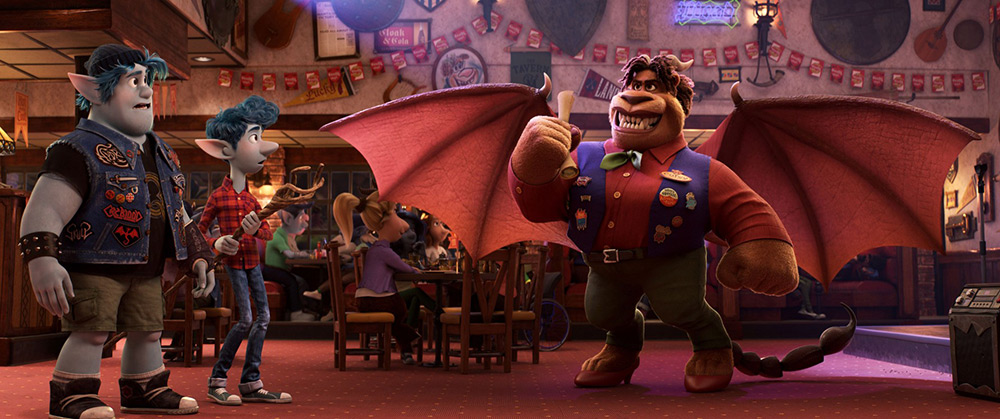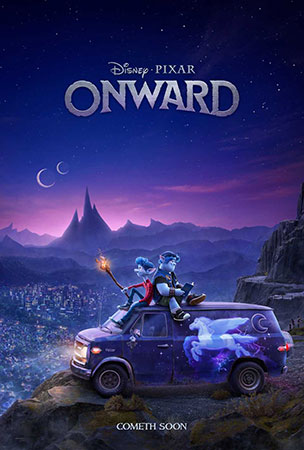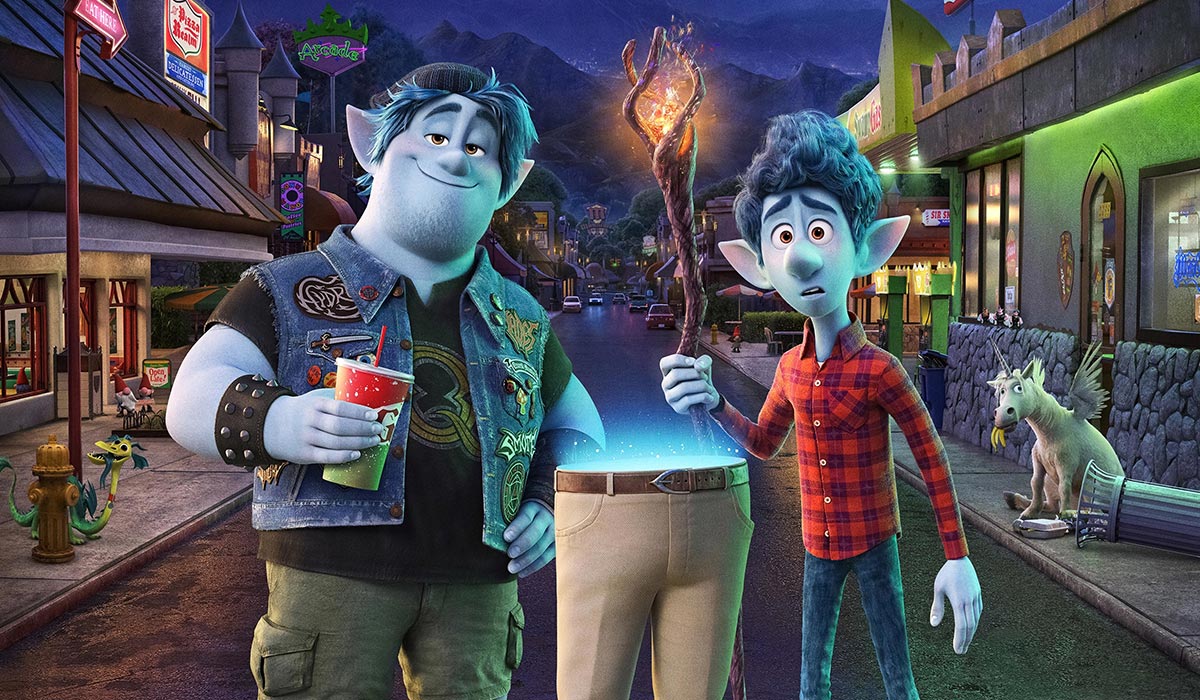There’s not much I look forward to more as an animation fan these days than the next original Pixar film. Don’t get me wrong, I enjoy their sequels as well. But there’s something special about getting to enter one of the studio’s unique world’s for the first time. In thirteen previous visits, I’ve only been disappointed once. In other words, the odds are always good that the DMs at Pixar are going to work their magic and wow audiences again with every new release. And Onward is no exception.
In a world of fantasy, technology has taken hold, making what was once an enchanting land a lot more ordinary. Ian is a teenaged elf trying to figure out who he is. His older brother Barley is a role-playing game enthusiast who forgets to leave the role-playing part at the table. On Ian’s 16th birthday he is given a gift left for him by his father, who died before he was born — a magic staff that will allow him to come back for one day to see who his sons have grown up to be. However, with magic so rare in the world, the boys must go on an epic quest in order to complete the spell.
The buddies-on-a-journey plot line seems to have become the go-to for way too many animated screenwriters these days. While there’s no question it’s overused, it can still work. The trick is fourfold: first, make sure the audience likes, cares about, or relates to the characters; second, set the journey somewhere unique or interesting; third, have a good reason for the characters to need to reach their destination; and lastly, make sure the journey actually matters and isn’t just a plot device to get from A to B. How does Onward fare on each criterion?
While story is king at Pixar, it’s the strength of the characters that is going to drive it forward. If they’re not likable or relatable, the audience is not going to get invested. The brothers at the heart of this film absolutely fit that bill, and are easily the equals of other great Pixar duos like Woody and Buzz, Mike and Sully, and Marlin and Dory. In fact, outside the parent willing to do anything for their child dynamic in Finding Nemo, Ian and Barley may be two of the most easy characters to empathize with on that list.

Pixar has always had a knack for world building. And the mashed up fantasy realm/modern world setting may be not only one of their funnest, but the one with the most potential. Because it’s so new and fresh, almost anything can happen and the audience doesn’t know what to expect next. Toys, race cars, and fish have some built in limitations to what you can do with them. Superheroes are overdone. Old men in flying houses, rats cooking in kitchens, and kids visiting the land of the dead are great one-off ideas, but their worlds are inextricably tied to their specific plots. The monster world may be the next most open, but taking those characters away from their jobs would make for a contrived storyline. But the world of Onward, much like the Dungeons and Dragons inspired game it revolves around, is an unlimited canvas where there are so many possible stories waiting to play out. And unlike the monsters world, these characters are free to move about it wherever the writers might want to take them.
Every quest has an end, and in a Pixar film that usually means tears are involved, even for those with the hardiest constitutions! In Onward, the worthwhile goal the boys are trying to reach is getting the chance to see their father one more time. So, yes, teary eyes will be the norm here once again! But let’s understand that it’s never because the writers are manipulating emotions in order to get that reaction. It’s because they have sent their characters (whom they got us to care about) on a journey to a place (that was worth the effort), and when they succeed in reaching their goal (especially when it happens in a way they and we weren’t expecting), we’re genuinely happy for them.
Of the four saving throws required to not fall into the usual buddies-on-a-journey movie traps, the most important may be ensuring the journey actually mattered. The goal is going to be a very small part of the film, after all. The majority of the running time is actually getting there. But having an interesting journey isn’t enough. The trek has to have significance. That can mean the characters grow along the way and maybe that changes their perspective. Or maybe they learn something that helps them achieve their objective. Without the trip itself being of some consequence, the whole plot will seem lightweight and trivial. Without wanting to spoil anything, let’s just say Onward crit hits this objective!
There are of course other things that make Onward work where others have not. A common issue the film avoids is the road trip never feels episodic. The boys’ journey is occasionally broken up with a separate plot line involving their mother looking for them. And the biggest thing that helps: it’s just a very funny movie! Comedy can sometimes be used to cover lingering issues. But when you’re doing so much right already, humor can really level-up a film.

One of my favorite things about Pixar movies is their occasional subversive wisdom. I don’t mean anything dark or dangerous — just outside the norm of what Hollywood usually considers for a children’s movie. Sometimes that’s the messaging: “If everyone is special, no one is” from The Incredibles, or “Not everyone can become a great artist, but a great artist can come from anywhere” from Ratatouille. Sometimes it’s an unexpected resolution, like Mike and Sully saving the day at the end of Monsters University but still being expelled because they broke the rules. Onward doesn’t go as far as those films, but still manages to surprise viewers.
The animation is outstanding in this movie, helped immensely by the fantasy genre. Character designs are varied and detailed, and dexterously merge the mythological with the mundane in a way that feels organic. Mountains, caves, and meadows are suitably stunning, while more pedestrian sets like schools, restaurants, and suburban sprawl are plussed up with thematically appropriate playful touches. The only negative I could add is that they might have done too good a job. By making it all look so effortless, some might not appreciate all the work that went into the designs.
The voice acting in Onward is solid — no surprise when you see the cast list! Chris Pratt gives an amazing performance as the good-natured but somewhat goofy Barley. Don’t be fooled. At first you may feel it’s just Pratt playing his usual role. But watch closely and you’ll see that he actually has the most work of any character in the film, in regards to the range of emotions he has to convey. Tom Holland is good as the intelligent but insecure Ian, but can’t help but pale in comparison to Pratt since most of his screen time is alongside him. I love Julia Louis-Dreyfus, but while she does a fine enough job I felt her performance didn’t always come across well (but some of that, as usual, could be down to writing). And Octavia Spencer is mostly fun as a manticore/business woman.
The only somewhat major complaint I could make of the film, if I have to, is with the music by (appropriately enough, brothers) Mychael and Jeff Danna. In dramatic or exciting scenes it came through strong and stirring! But it was otherwise just there in the background. Of course, that’s where background music is supposed to be! But I did say I was only making this criticism if I had to.
The wizards of Emeryville have made every ability check: Onward is great storytelling combined with charismatic leads in a unique world wrapped up in beautiful animation. Definitely take the initiative to see this one because it is a campaign worth playing.
 | Onward Disney, Pixar 103 minutes Rated PG directed by Dan Scanlon | |









Good to hear your positive thoughts on Onward. I had a good feeling about it after the D23 preview. And with Soul coming out later this year, I think Pixar may have two real gems to offer this year.
(Although if it's "the" disappointing Pixar, everyone assumes Cars 2, which is unfair to Good Dino.)
Pretty sure an "8" is the highest rating James has given since the first Lego Movie.
This is probably the most I've ever written about a film without actually saying anything about the film! So just about a completely spoiler free review. If you've seen any trailer, you're probably fine reading this!
Dacey's right, this is my first review higher than a "7" in six years. Keep in mind though that different factors make it hard to really compare movies. Frozen I probably would have normally given a "6", but the music was so good. Kubo could have easily been an "8" with a few fixes. Both are "7"s but I'd probably consider one better than the other.
Hey, just realized my last two "8"s are both Chris Pratt films!
(Giving him a crazy gonzo partner in this one provides a lot more needed impetus to
Although think the writers sensed the story was thin, since just about everything in it is concocted to be Useful somehow--
(Favorite don't-blink Easter-egg: A fast-food restaurant's sign saying "Burger Shire: Now serving 2nd Breakfast"
That was the one joke I was pointing out to my family after we saw it too! There's also a frozen yogurt place called Master Froyo!
If it'd been Warner, we'd have spotted the baldfaced attempt to use the in-house streaming service to undercut the Blu/DVD physical sales ahead of time, and shamed it right back down their throats in public.
Yes, we are
On another subject, even with the Brazilian Pixar-knockoff company out of business, the usual suspects have not been idle:
{ CLICK HERE TO VIEW THIS IMAGE }
https://www.youtube.com/watch?v=PrpXpzxNvik
I used to want to start a website documenting all those Disney knockoff videos. Which I had got around to that...